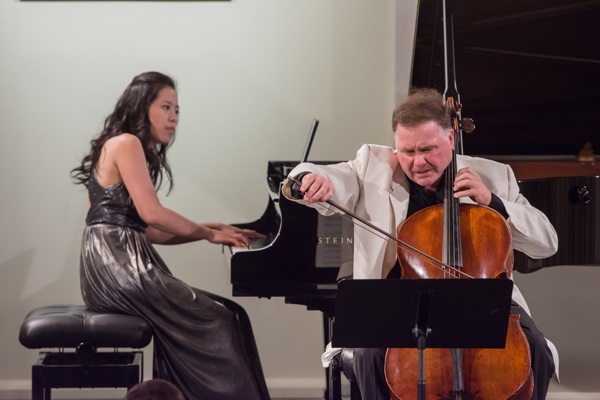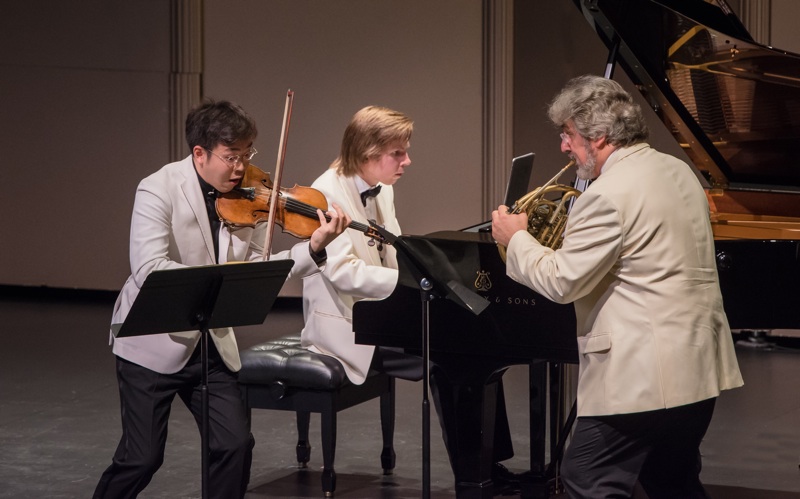Deep feeling and smooth expression
An evening of explosive playing and heavenly sonorities made for another special evening at Music@Menlo, the Peninsula’s prized music festival. Last Monday, July 24, they held their fourth main concert in a series of seven, “In Joachim’s Orbit,” featuring chamber music at the height of German Romanticism. After three concerts devoted to the development of violin writing, here they widened their scope to include two gorgeous horn concertos and Mendelssohn’s well-known cello work, Lied ohne Wort (Song without words).
There was razzle and dazzle and butter cream, and a bit of heavy-handedness, all in two short hours, performed by names that one may see in concert halls across the world. They opened with Felix Mendelssohn’s cello work, and although it is titled “Song without words” it may have been written for voice and text and then revised into the language of a cello’s deep longings. Cellist Keith Robinson made that soaring line memorable, keeping it upbeat and never over-speaking his lines.
 And that “text?” There was a gentleness and courtesy there in the fragile opening of a phrase and in its tremulous end, and a feeling of joy in the middle of a life that was all too brief.
And that “text?” There was a gentleness and courtesy there in the fragile opening of a phrase and in its tremulous end, and a feeling of joy in the middle of a life that was all too brief.
Radovan Vlatkovic next took the stage for Robert Schumann’s Adagio and Allegro for Horn and Piano. I don’t think I have ever heard the French horn played with such smooth warmth, with faultless notes that came in on impossible pianissimos and then swelled into golden belling. Gloria Chien brought a careful pacing to the piano part, and this was almost too smooth for the torrid forms of Romanticism.
They embarked on the “Allegro” with acrobatic horn triplets and sparkling piano notes, bright trickles and coy echoes.
Vlatkovic returned in the second half for Brahms’ famed Horn Trio in E-flat Major, with Juho Pohjonen on piano and Paul Huang on violin, and that was another triumph. A typical piano trio is written for piano, violin and cello, but here Brahms substituted French horn for cello for a punchier mix and some arresting timbres. There were passages where Huang would play low throaty violin notes while the horn would be high in its range, and that compelling double sound would go right through you.
Huang entered with rich passages low in the violin’s register, presaging Vlatkovic’s careful restatements and slow development. There were solemn moments and seamless spans of Romantic yearning, all propelled by Pohjonen’s attention and restraint. That restraint allowed the other two to tweeze out subtlety and delicate notes and then they all built to noble thunder in the second movement.
In the slow movement they created more deliberate arcs of notes, darkly colored, and one could feel the chill of the grave here – and it was written to commemorate the passing of Brahms’ mother – but after sorrows and storms the final movement returned us to that earthy satisfaction which is a hallmark of Brahms, with sweet high violin notes and radiant piano and a horn galloping on the hunt.
Titled “In Joachim’s Orbit,” this concert looked at how one of Europe’s greatest violinists, Joseph Joachim, inspired great writing. A student of Mendelssohn, Joachim championed Beethoven’s Violin Concerto and then helped Brahms with his Violin Concerto and even wrote the cadenza. His own playing emphasized the violin’s innate sweetness (and that was the character of Mendelssohn’s Violin Concerto) and that was apparent in his own composition, Romance No. 1. But this was a more somber sort of charm. Here violinist Yura Lee paired with Pohjonen to give us a quiet lucidity, with low violin notes on a simple and moving theme.
Joachim also inspired Schumann, who dedicated a violin concerto to him. Yura Lee, Robinson and pianist Gilbert Kalish performed his Piano Trio no. 3, a work of tempests and passions written later in his life when he was desperately fighting his mental disease. That work is a tribute to the human spirit.
Every summer for the last fifteen years, the Menlo School, a private school tucked away on the Peninsula, hosts one of the Nation’s most prestigious summer music festivals and chamber institutes. Music@Menlo was brought to life there by pianist Wu Han and cellist David Finckel as a place to explore chamber music with some of the best musicians in the biz. This “power couple,” as they are often described, still tour and perform, and for the last ten years they have also managed the Chamber Music Society of Lincoln Center.
That busy life of performing and programming has allowed them to work with many other musicians, a pool of top talent from which to draw. But it is their drive to educate that has made them stand apart from other festivals.
That drive manifests in two ways. During the month of the festival their performers also teach gifted young artists in the Young Performers program for musicians aged 10 to 18, and in the International program for 18 to 29 year olds who have begun to concertize. Those young pupils both study and perform, with free “Prelude Performances” before every main stage concert.
And secondly, they encourage the education of their audiences with free audio notes available before each concert, and open Master Classes and round table discussions with performers and musicologists, their “Café Conversations.” Topping it off, there is a series of five evening-length lectures, nearly as popular as the musical events (and those lectures have lots of music!).
To keep it fresh, each year they have a different overarching theme, and this year’s theme, “The Glorious Violin,” follows the shaping of that instrument from workhorse to race champion.
There is just one more week of this extensive festival, and any event would be worthwhile. See musicatmenlo.org for programs and tickets.
—Adam Broner
Photo top of Gloria Chien and Keith Robinson in Mendelssohn’s Lied ohne Worte at Menlo; below, Paul Huang, Juho Pohjonen, and Radovan Vlatkovic performing the Brahms’ Horn Concerto; both photos by Carlin Ma.

